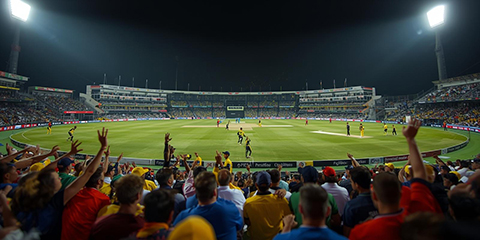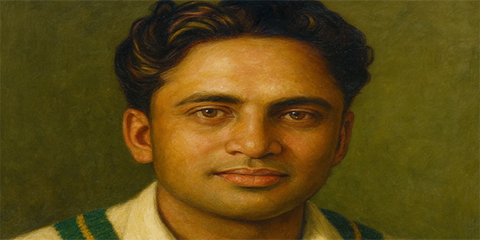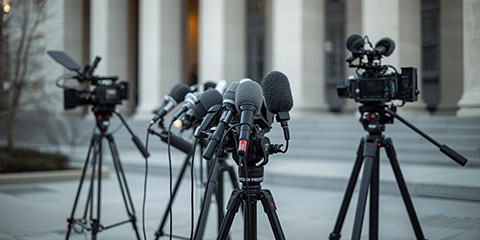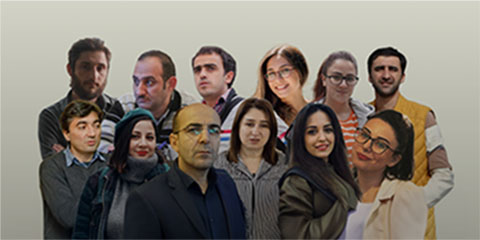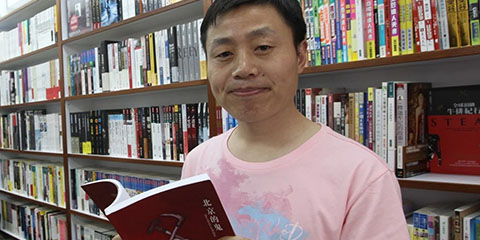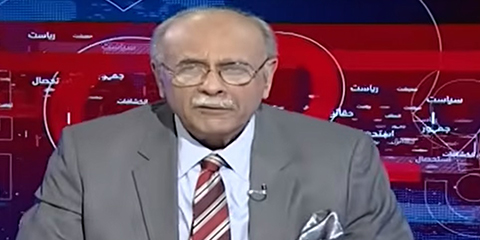Inside the 32-year career of Pakistan's iconic sports journalist Waheed Khan
JournalismPakistan.com | Published 3 months ago | Dr. Nauman Niaz (TI)
Join our WhatsApp channelISLAMABAD — When I first walked into the press box with the accreditation card of The News International, wearing it rather awkwardly, it was not unlike the feeling a young cricketer might have when stepping out to bat at Lord's for the very first time: unsure of his gait, yet filled with the tremble of great ambition. It was the early 1990s — 1992 or perhaps '93 — and I was a novice in a landscape already brimming with luminaries, each voice more resonant, each sentence a line of literary expression or a scoop of hard-won truth.
Cricket Journalism as National Identity in 1990s Pakistan
There was a tremor in the soul of journalism those days, especially when it came to the reporting of cricket, that most noble of pastimes, that blend of artistry and duel, statistics and story, where even the sound of an appeal had a kind of musical cadence. To be a cricket correspondent in Pakistan in those heady days was not only to report, it was to become an essay of national emotion.
Cricket in Pakistan, as in many other parts of the subcontinent, was not a game at all. It was an inheritance, a faith, a family tradition, a battleground, and at times, in those tumultuous 1990s, a courtroom drama with batsmen as defendants and selectors as unpredictable judges. I had stepped out of a more stable mainstream profession, rebelling like a young right-hander eager to face a fast bowling attack on a green pitch, with little more than hope and a notebook. I had dreams, yes, rather like a child with a feather for a bat and the sky for a field, but dreams in the presence of giants tend to shrink unless one gathers the courage to cast a longer shadow.
The Literary Giants of Pakistani Sports Media
And giants there were. Each morning, I read them in the newspapers, their voices vivid, textured, elegant, and unflinching. There was Merry Max — Maqsood Ahmad — who had once played for Pakistan, and who wrote as if he still knew the precise footwork needed to survive at the crease. Then came Imran Naeem Ahmad, whose Oxfordian elegance seemed sculpted from an English oak tree, sentences flowing with a scholar's measure, yet never detached from the game's emotional undercurrents.
Gul Hameed Bhatti was a man of numbers, yes, but never dry. He could breathe soul into a scorecard; he made a century mean more than just three figures. Khalid Hussain came with aristocratic poise, his writing as smooth as a cover drive and as intellectually rich as a Proustian paragraph. And how could one forget Imtiaz Sipra? If ever there were a lyrical mystery spinner of words, it was he, a man who could wrap cadence around cricket like a shawl in winter.
Breaking Barriers: Women Pioneers in Sports Journalism
Even the women in our craft stood shoulder to shoulder, no less fierce in their insight. Fareshteh Gati Aslam, confident to a fault, wielded her investigative journalism boldly, cutting through the bureaucracy with finesse. Kamila Hayat, with her quiet authority, seemed to understand sport not just as competition but as culture. There was a unique empathy in her tone, one that reminded me of writers who knew the game's deeper shadows. Afia Salaam, more subtle and following the order of time.
Waheed Khan: The Reporter's Reporter
Then there was Waheed Khan. Waheed.
Blunt, brazen, and wonderfully incapable of being intimidated. If we were a symphony of styles, Waheed was percussion, not the delicate rustle of brushes on snare, but a full-throated crash of cymbals when needed. He was the reporter's reporter, a man who let his instinct guide his writing and who filed his copy with a flow that belonged entirely to him. Each morning, I sought his piece not only for news but for narrative; he told the day's story like one who had seen it unfold in slow motion.
The Karachi Press Contingent: A Brotherhood of Excellence
I first met him during the Australia vs Pakistan series of 1994-95, a series not without its drama and undercurrents. The Karachi contingent, of which Waheed was very much a central part, moved with the confidence of men who had already earned their stripes. There was Sami Ul Hassan of Dawn, sharp-eyed and deliberate; Abdul Rasheed Shakoor of the BBC, whose tone always held a touch of depth and seriousness; Shahid Hashmi of AFP, fast, direct, with the pulse of the wire service ever-beating within him; and Abdul Majid Bhatti, the quiet observer whose words often struck deeper than most. Mirza Iqbal Baig added the voice of radio and television, and all of them together were formidable in their unity.
They were proud men, yes, perhaps even a touch arrogant, all from Karachi, but their respect for legends was evident. Whenever Imtiaz Sipra or the old masters like Farooq Mazhar, Omar Kureshi, Chishty Mujahid, or Qamar Ahmad stepped into the press box, there was a reverent hush. The torch had not yet changed hands, but we were all watching the flame.
Finding Mentorship in Professional Brotherhood
Waheed was the first to let me in. In a world where every man protected his contacts like a wicketkeeper guards his gloves, he was open. We covered matches, international, domestic, dull draws, thrilling finishes. We argued, we shared meals, we cursed the slower score updates. There were moments of joy and those of tempers fraying. But there was work, real work, and in Waheed I found not just a colleague, but a co-conspirator against lazy journalism.
Standing Against Corruption: The Match-Fixing Scandal Era
The mid-1990s brought turbulence to Pakistan cricket, not the casual ups and downs, but real tectonic shifts. Match-fixing scandals, administrative coups, fallen captains, betrayed teammates, whistle-blowers. Many blinked. Some looked the other way. But Waheed did not. Nor did Fareshteh Gati or I. We wrote what needed to be written, even if it meant missing a press pass or making a few enemies in the corridors of the PCB. We believed Rashid Latif, not because it was convenient, but because his truth had the echo of conviction.
To stand against the hierarchy then was not just a pose. It took steel. And Waheed had plenty of it. He was not dipped in fear. He wrote as he saw, as he felt. The morning's copy, sometimes laced with sarcasm, often startlingly direct, was his verdict on the previous day's farce or triumph. While others waited for consensus, Waheed carved out his own version of the truth.
Reflections on Early Career and Lasting Gratitude
Looking back now, decades later, I find myself smiling at the boy I was, idealistic, uncertain, desperate to make his name among giants. That boy still lingers, perhaps softened by time, perhaps emboldened by the years. But one thing remains unchanged: my awe for those early voices, and my gratitude for a man like Waheed Khan, who chose not to gatekeep but to guide.
To write cricket is not just to document matches. It is to write of nations, of heartbreak, of ecstasy, of men rising and falling in whites under a sun too bright to bear. In those early years, I was just learning to listen, to the rustle of newspaper pages, to the soft click of typewriter or keyboard keys, to the rumble of stories waiting to be told. And in that soundscape, Waheed's voice, forever unafraid, still rings loud.
From Typewriter to Global Wire Service: The Making of a Media Professional
Some men walk into a profession. And there are those in whom a profession takes residence, never quite allowing them to leave, never letting go, as though some sacred pact had been struck in the cradle of their calling. In the story of Waheed Khan, it is not journalism that he pursued, but journalism that found him, in the stray pause between cricket overs on a Karachi ground; in the clack of a typewriter that first echoed beneath flickering lights of a wire service desk; in the hush before a breaking story cast its net upon an unready nation.
It is a long, sinuous tale, not the hurried life of a byline-hunter, but the textured, richly-scored journey of a man who married vocation to passion with the steadfastness of a Test-match opener. Waheed Khan, known to his peers simply as Waheed has never quite been out of the game, nor out of the game's mirror: the newsroom, the studio, the edit bay, the broadcast truck, the Twitter thread. If there is one truth across three decades of his media life, it is this, Waheed has never stood still.
The Pakistan Press International Years: Building Foundations
He began, as all romantics must, with a typewriter. The kind that tests a man's fingers, and more so, his patience, keys hard as ambition and just as noisy. This was not an age of soft screens and seamless corrections; no, Waheed's fingers sang on steel alphabets, ten of them, taught through disciplined hours at courses taken not out of whimsy but out of intent. The typewriter, for him, was not a machine. It was an old friend, moody and stiff, yet loyal to the ends of a sentence.
He was, in those first fledgling days between 1988 and 1990, a young sub-editor and reporter at Pakistan Press International, an agency not famed for glamour but revered for rigour. It was here that the idea of a complete media man began to assemble in pieces: grammar on deadline, syntax on caffeine, news value measured against moral cost. Waheed saw news not just as information but as orchestration, a symphony to be arranged, note by note.
The News International Era: Fifteen Years of Excellence
But cricket called, as it so often does to those born in its sun-shadow. Waheed, it must be said, did not only write cricket. He inhabited it. From the dressing rooms to dusty nets, from quiet hotels in Leeds to chaotic press boxes in Lahore, his style always knew the flow of a leg glance and the sudden violence of a bouncer. He wrote as if the game's soul whispered in his ear, lyrical, wry, and yet grounded in detail so precise, it made statisticians weep with gratitude.
At The News International, Pakistan's national English daily, Waheed found not a job but a long innings, 15 years of dispatches that read like epics on newsprint. From 1990 to 2005, he crisscrossed continents chasing Olympic flares in Sydney, tracking the zigzag runs of hockey sticks in Kuala Lumpur, smelling the sweat-drenched air of cricket World Cups. He was not a correspondent; he was a raconteur. His prose, even when boxed into columns, refused to be caged. It flowed, strolled, lifted, like a late cut off the back foot on a green English wicket.
His voice, that firm, composed voice seasoned by decades, carried weight. In press boxes, younger reporters would listen not for quotes from players, but for the quiet thunder of Waheed's conversations with senior cricketers and coaches. For he asked the questions others feared to raise, and got answers no one else could. Trust was his currency, and he spent it wisely.
Reuters Years: Global Perspective and Disaster Reporting
Then came Reuters, not as a flirtation, but as a second wind. From 2002 to 2015, Waheed served the global wire with a sense of purpose that surprised even his seasoned colleagues. Here, in the stark objectivity of Reuters' style, his sentences grew leaner but never lost their breath. As the main sports reporter for Pakistan, and later as a staff correspondent, Waheed was no longer just reporting matches; he was decoding the tectonics of sport in a country that breathes controversy like air.
He covered not just runs and goals but tremors and calamities. The 2005 earthquake, brutal, unthinkable, saw him write not of wickets fallen but of worlds collapsed. His reportage then was not adorned, nor poetic; it was spare, stripped, humane. His pieces became evidence of a journalist's deepest oath, to witness, and to record, even when the heart resists.
Television Pioneer: From Geo English to Geo Super
Yet it would be false to reduce Waheed to the written word. His voice, calm, lucid, commanding, found its full register in the theatre of television. Joining Geo English in 2007 as head of sports, he brought to the screen the same editorial spine he had once applied to news copy. Later, as a senior anchor and host on Geo Super, he became not only a broadcaster, but a presence, familiar, reliable, always slightly amused at the circus around him.
He anchored shows with the confidence of a man who had nothing left to prove, and yet everything left to give. Interviews were never interrogations but conversations. And breaking stories — oh, how he broke them. The exclusive footage of Pakistan Cricket Board's match-fixing inquiry meetings, aired under his stewardship, rattled the game's highest rooms. There was shock, yes. But also awe that one man could once again be ahead of the curve, ahead of the denial, ahead of the official line.
Digital Age Adaptation: Cricket Baaz and Social Media Mastery
Today, Waheed Khan, now the founder and soul of Cricket Baaz on YouTube, has not retreated into memory, as veterans sometimes do. No, he remains, tweeting, filming, scripting, anchoring. Not with the energy of a man refusing to age, but with the grace of one who has always understood that stories have no retirement age. The digital world, with its hungry appetite and short attention spans, has found in Waheed a surprising ally. For he understands the game has changed and so has the crowd, but the fundamentals endure. Integrity. Insight. Intuition.
He is candid about his present. After stepping down from television, he now files regularly for the Press Trust of India and contributes to select international publications. His commentary on Pakistani sports — especially cricket and field hockey remains sharp, considered, and necessary. Twitter is his canvas now, brief but bold. Here he informs, provokes, and occasionally smiles in 280 characters, the man who once wielded paragraphs like sabres now trims his thoughts with the precision of haiku.
Beyond Sports: A Complete Journalist's Range
Yet it would be unjust to confine Waheed only to the realm of sport. His experience, honed in the crucible of political events and human catastrophes, lends depth to his commentary. He has covered elections, terrorist attacks, and national emergencies, and always with the discipline of a craftsman. That he can turn, with equal finesse, to the footwork of a footballer or the footfall of a protest march, is testament to his range.
A Legacy Built on Humility and Excellence
There is something almost cinematic about his career, but it resists melodrama. Waheed Khan has never advertised his sacrifices nor magnified his triumphs. He is not a man who poses with his accolades. Instead, he wears them like a well-used fountain pen carried always, mentioned seldom. What remains most remarkable, perhaps, is his humility. He says, without a flicker of false modesty, that his greatest reward has been hearing younger journalists say they took inspiration from him. It's a quiet legacy, but a lasting one, less flashy than awards, more enduring than plaques.
To Waheed, journalism was never just an occupation. It was identity. And in this identity, he found a nation, flawed, vibrant, unpredictable, to love and to critique. In his words, one finds a chronicle of Pakistan's sporting life; in his career, one sees the story of the media's evolution in South Asia. Print. Wire. Television. Digital. Few have danced across all formats and still kept their feet.
Modern Approach to Traditional Values
He is not nostalgic about typewriters, though he smiles when asked about them. Nor does he mock social media; he sees in it a new avenue for dialogue, a way for readers to push back and demand better from the press. He drinks tea, not coffee; prefers Netflix over nightclubs; and still feels most at home on a cricket field or beside a hockey turf. He does not reminisce aloud often, but when he does, it is not to mourn the past; rather, it is to remind the present of its roots.
And in these restless days, Waheed remains open to new adventures. He welcomes collaborations, partnerships, and sponsorships, not because he needs validation, but because he still has much to give. His YouTube work is just the beginning. A blog is on its way. And the best pitches, he says, come not with gloss, but with honesty. His advice to young journalists remains as sharp as ever: do not enter the field without passion. Do not pretend to care. Because in this profession, pretense withers fast. Only love, deeply held, can survive the newsroom's storm.
Thirty-two years. Typewriters to Twitter. Reuters to Geo. A journey vast as a cricket outfield and just as unpredictable.
Waheed Khan stands now not as a retired warhorse, but as a seasoned maestro, his baton still raised, his eye still sharp, his heart still tuned to the music of a well-told story.
And what is journalism, if not a lifelong innings, played with a clear mind, and the quiet defiance of one who believes that stories matter? Waheed Khan, the complete media man is still at the crease. And he shows no signs of declaring.
Global Tournament Coverage: A World-Class Correspondent
And so, it may be said, not with trumpets, but with the quiet authority of accumulated truth, that Waheed Khan, during his storied years at The News International, did not only attend the great tournaments of the sporting world; he inhabited them. The Summer Olympics, those grand quadrennial operas of human potential; the FIH Hockey World Cups, where the turf throbbed with tribal loyalties and flickering sticks; the Cricket World Cups, with their tides of triumph and heartbreak; the Commonwealth Games, breathing the last vestiges of Empire into modern striving; the Asian Games, with their mingled sweat and symbolism — he was there for them all, not as a tourist with a press pass, but as a chronicler with purpose.
To list the venues he graced would be to unroll a map of human ambition: Sydney, Kuala Lumpur, Birmingham, Delhi, Athens, Melbourne, London, Beijing, and beyond. His gaze understood that behind every stopwatch click, every run chased, and every flag raised, there existed not just competition, but narrative. And he caught those narratives mid-air, before they dissolved into forgetfulness, and pinned them to the page with the certainty of a man who had seen sport not as escape, but as a mirror to the world.
Legacy of Excellence: A Timeless Testament
And now, though the arenas may echo with newer names and fresher cameras, somewhere in the silence between one tournament and the next, one may still hear the lingering footfall of a journalist whose devotion never aged. Waheed Khan, neither lost in the past nor racing for the spotlight, remains, like a classic innings unmarred by time, a testament to a life richly lived, and still in motion.
Dr. Nauman Niaz is a civil award winner (Tamagha-i-Imtiaz) in Sports Broadcasting & Journalism, and is the sports editor at JournalismPakistan.com. He is a regular cricket correspondent, having covered 54 tours and three ICC World Cups, and having written over 3500 articles. He has authored 15 books and is the official historian of Pakistan Cricket (Fluctuating Fortunes IV Volumes - 2005). His signature show, Game On Hai, has been the highest in ratings and acclaim.








